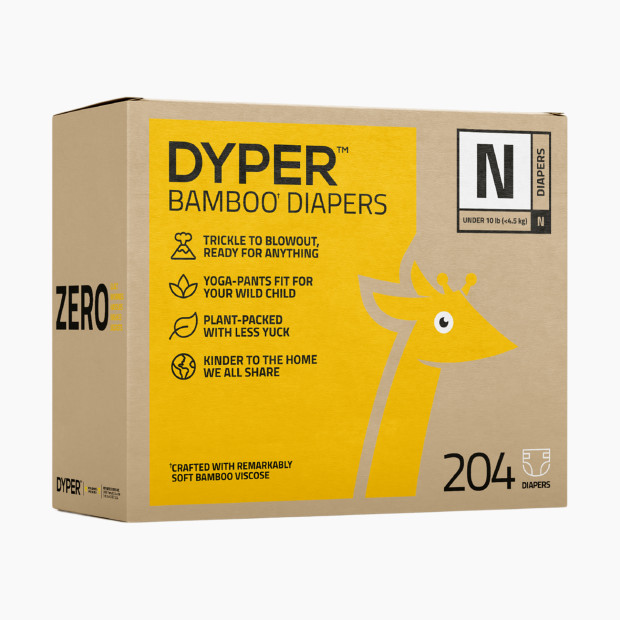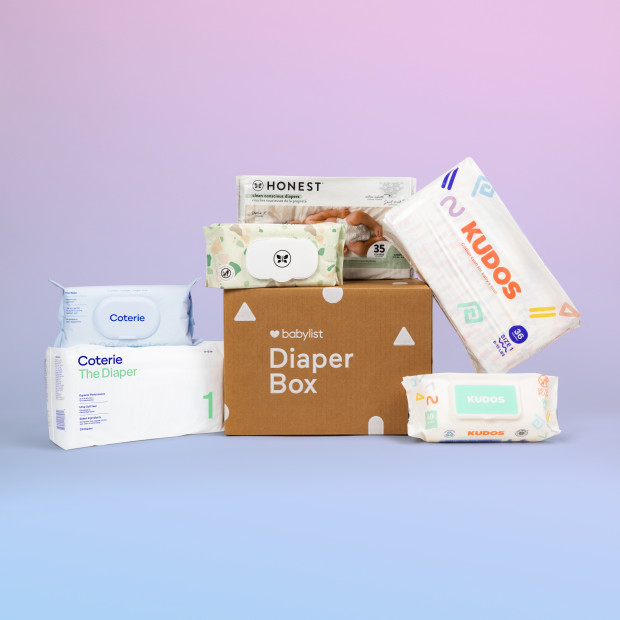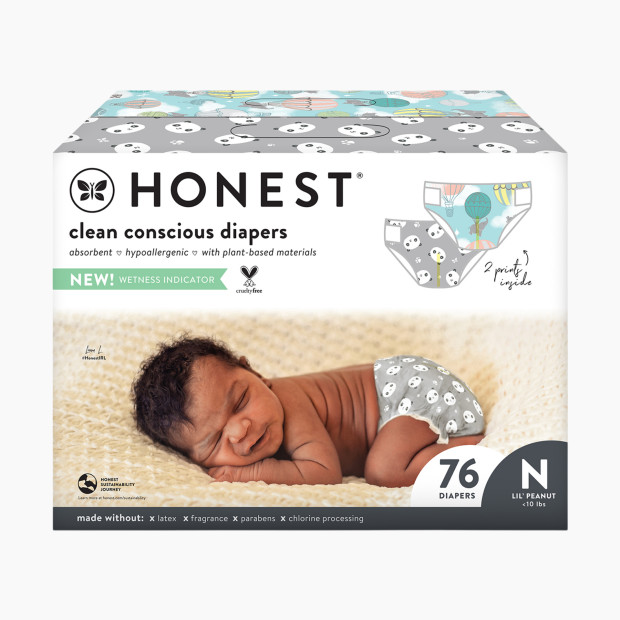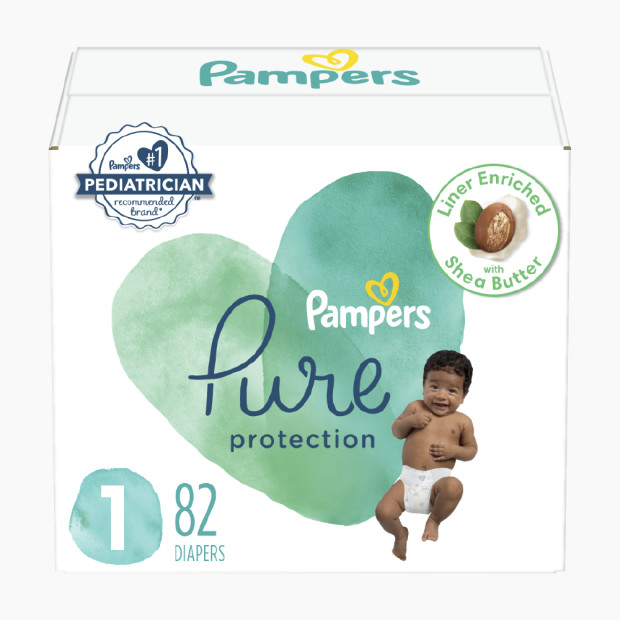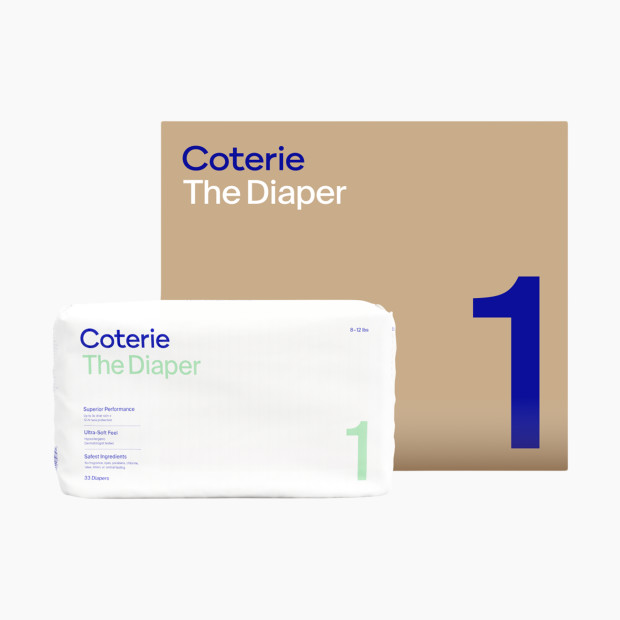Best Eco-Friendly Diapers of 2024
From compostable to organic, your guide to disposable diapers that are a little better for the earth.
There’s a lot to love about disposable diapers, especially how convenient they are and how far they’ve come in keeping your baby’s skin dry and comfy throughout the day and night. But then there’s their impact on the environment, an unfortunate reality that can’t be ignored.
Most babies will go through about 5,000 to 6,000 diapers before they are potty trained. And since disposable diapers don’t biodegrade, about 3.3 million tons will end up in landfills in any given year.
Eco-friendly diapers have set out to change all that. Are they perfect? Definitely not. Not all eco-friendly diapers are created equally, and there’s a long way to go before we start to really move the needle on lessening the environmental impact from most disposables, even those labeled as eco-friendly. But they’re certainly a step in the right direction and worth a look if you’re interested in offsetting your footprint when it comes to disposable diapering.
Babylist’s Top Picks for the Best Eco-Friendly Diapers
- Best Compostable: DYPER Bamboo Viscose Baby Diapers
- Transparent Ingredients: Nest Baby Diapers
- Family-Owned: Andy Pandy Bamboo Disposable Dypers
- Longtime Favorite: Eco by Naty Baby Diapers
- Best Bundle: Babylist Diaper Box
- Best Sustainable: Bambo Nature Dream Baby Diapers
- Best Subscription: The Honest Company Club Box Diapers
- Cotton Core: Kudos Diapers
- Most Stylish: Freestyle Hyper Absorbent Diapers
- Best Name Brand: Pampers Pure Disposable Diapers
- Best Luxury: Coterie Ultra Soft Diapers
- Most Comfortable: Parasol Clear + Dry Diapers
- Brain-Friendly: Healthybaby Monthly Diaper Bundle
In This Article
Babylist’s Picks for the Best Eco-Friendly Diapers
Compostable or Partially Compostable Eco-Friendly Diapers
Best Overall Eco-Friendly Diapers
Dyper truly delivers on their promise to create an eco-friendly, compostable disposable diaper. These unprinted, unscented Bamboo viscose diapers are soft and absorbent and are free of things like chlorine, latex and alcohol, but it’s their ability to compost that really makes them shine. Soiled diapers (yup, even the poopy ones) can be returned for composting through the brand’s optional REDYPER service. There are two options: curbside pickup (available in select metropolitan areas and growing) or via mail with a prepaid bag/box/label kit. The composting does come at an additional cost, but it’s well worth it if it fits into your budget and you’re looking to reduce your environmental impact.
Compostable + Transparent Ingredient List
Much like Dyper, Nest’s disposable diapers are an eco-friendly option that are compostable in municipal and industrial composting facilities. There’s no nationwide composting subscription option here, though; Nest is currently only partnered with two diaper compost providers in the Minneapolis and San Francisco areas. (But they are actively pursuing more partners throughout the country as services expand, so stay tuned.)
Other features to love about Nest diapers: they’re made from sustainable ingredients (there’s even a materials chart on their website that lists every single diaper ingredient and its function, impact and environmental summary) and free of chemicals, lotions and perfumes.
Family-Owned and Operated
This family-operated Michigan-based brand was founded with the mission of creating a disposable diaper that was better for both children and the planet. Made with a layer of 100% bamboo fiber, Andy Pandy diapers are about 87% biodegradable, degrading by more than 60% in 75 days. They’re also moisture-wicking to stave off diaper rash, free of alcohol and chlorine and hypoallergenic.
Longtime Eco-Friendly Fave
Naty, a Swedish brand founded by a mom, has been working toward developing a more eco-friendly diaper for over 25 years. Their Eco diapers use renewable, compostable materials whenever possible and have 0% oil-based plastic touching baby’s skin. The diaper’s core is made from 100% wood pulp (among other naturally biodegradable materials) and is 85% compostable. They’re also super transparent about their ingredients list and environmental certifications.
Interesting to note: Naty also makes a line of sustainable, eco-friendly women’s care products like tampons, nursing pads and more.
Sustainable Eco-Friendly Diapers
Best Eco-Friendly Diaper Bundle
If you’re overwhelmed by which brand of eco-friendly diapers to choose, Babylist’s Diaper Box is exactly what you’ve been waiting for. This exclusive bundle includes diapers and wipes from three popular eco-friendly brands: The Honest Company, Dyper and Coterie. There are 100 diapers and 190 wipes in all and everything is free from chlorine, fragrances and parabens. You’ll get the chance to try out each before you stock up.
Best Sustainable Diapers
This Danish brand prioritizes sustainability from start to finish and is a great choice if you’re looking for a more eco-friendly diapering option. The wood used for pulp is derived from sustainable forestry, and 95% of all waste produced from the production of Bambo diapers is recycled. The diapers are even produced in a facility powered completely by wind energy. Their fully breathable back panel helps to prevent diaper rash and they’re free of many of the chemicals and perfumes found in more traditional disposable diapers. There’s also a wetness indicator that lets you know when it’s time for a change.
Best Eco-Friendly Diaper Subscription
Cute designs aside (and they sure are cute), there are several eco-friendly features of Honest Diapers to love. The brand’s Clean Concious line is designed with plant-based materials and the fluff pulp is sourced from sustainably-managed pine and spruce trees in Scandinavia, helping to save about 7,000 trees each year. New additions include a wetness indicator, Poo Pockets for extra messy situations and stretchier sides for babies on the move.
Cotton Lined
Kudos diapers stand out from the crowd because of their liner. Unlike most disposables, Kudos are lined with 100% cotton, so there’s no plastic—or anything else—touching your baby’s sensitive skin. There’s also two-layer protection to prevent leaks and no chlorine, latex, phthalates or fragrances. Kudos are available one box at a time or via a monthly subscription service.
Most Stylish Eco-Friendly Diapers
These trendy diapers stand out from the crowd with their cool, modern design. What’s inside is just as modern: a proprietary BambooTek sustainable core that’s free of chemicals and designed to quickly absorb and lock in moisture. (Absorbency isn’t always great with plant-based diapers, but Freestyle more than passes the test.) You can order them as a monthly subscription service or a la carte. Just note that these diapers run on the smaller side, so you’ll want to size up when ordering.
Best Mainstream Eco-Friendly Diapers
Pampers Pure is this mainstream diaper brand’s most natural option. Each diaper has a plant-based liner enriched with shea butter and contains 0% chlorine bleaching, fragrances, parabens or latex. Parents rave about the diapers’ softness and absorbency as well as the convenience of the wetness indicator. They’re also one of the more affordable eco-friendly disposables on our best-of list.
Best Luxury Eco-Friendly Diapers
Ask anyone who’s tried Coterie and you’ll likely hear how luxuriously soft and super absorbent these diapers are. They’re ultra-wicking to keep your little one dry and comfortable (they promise to move liquid away from your baby’s skin about four times faster than other diapers) and hold about 70% more than competing brands. They’re also made from 25% plant-based materials and donate 1% of their net diaper sales to Diaper Recycling Technology, an organization working to develop a technology that can recover up to 95% of the raw materials of a used diaper. Coterie diapers are available via a subscription service or a one-time purchase.
Most Comfortable Eco-Friendly Diapers
Dubbed the “yoga pants of diapers,” Parasol diapers are super soft, designed for maximum movement and feature a high-rise fit. Unlike traditional disposables that often have a thick, bulky design, Parasol diapers have an ultra-thin core, giving them a much lighter feel and helping to reduce the diapers’ carbon footprint. The breathable design and special RashShield fabrics help prevent diaper rash and the ingredients list is free of things like chlorine, alcohol, dyes, fragrances and latex.
Eco-Friendly and Brain-Friendly
If you’ve ever tried Happy Family Organics baby food—and we bet you have—then you’re already familiar with the founder of the Healthybaby brand. Their disposable diapers are made from plant-based materials in a sustainable facility. There are no fragrances, lotions or odor absorbers and the diapers are free of allergens and irritants. There’s also an outer layer made from organic cotton for added softness. Healthybaby diapers EWG verified and each monthly bundle comes with diapers, wipes, expert-created monthly developmental tips and activities and access to a 24/7 Parent Concierge service.
How We Chose the Best Eco-Friendly Diapers
- We analyzed results from Babylist’s Best Baby Products survey, which polled almost 3,000 Babylist users and asked them to share the baby products they love the most and why.
- We utilized insight from the Babylist editorial team, including Gear Editor Jen LaBracio, an expert in the baby space for over six years and a mom of two who has written hundreds of baby gear guides and personally researched and tested hundreds of baby products, including many eco-friendly diapers.
- We read and analyzed research studies from organizations such as the US Environmental Protection Agency and the National Institute of Health.
- We reviewed customer reviews from hundreds of real Babylist parents.
Types of Eco-Friendly Diapers
Eco-friendly is an umbrella term that’s thrown around fairly liberally by diaper companies these days. Scan a few labels and you’ll likely see terms like “made with biodegradable materials,” “sustainable,” or “compostable.” So what does it all mean? It’s helpful to have a basic understanding of what’s what before you choose which diapers are right for your family.
- By definition, the term biodegradable means that under the right conditions, a product or item will eventually break down to its original form. While there are some components of certain diaper brands that may biodegrade under specific conditions, there is no such thing as a biodegradable disposable diaper.
- Next on the buzzword list: compostable. When a diaper company uses this term, you might think it means that the diapers you send off in the trash will break down bit by bit rather than spend decades taking up space in a landfill. Unfortunately, that’s not quite the reality. In order for a diaper to compost (break down into organic material), there are several factors at play, including things like the diaper’s composition and how much oxygen is available around it. Other things like the presence of microorganisms and even the soil can also factor in. Keeping in mind that landfill conditions aren’t optimal for composting, and that no disposable diaper is 100% compostable, you’re often left with an eco-friendly diaper that may take less time to break down than a traditional disposable but won’t magically disappear when it hits the trash.
- Sustainable diapers are free of some of the more common chemicals found in traditional diapers and generally have a less harmful impact on the environment. Sustainable does not equal compostable, however, so keep that in mind. They’re generally made from some plant-based materials—the percentage of which can vary wildly brand-by-brand—and many brands that make these types of diapers often give back in some way, such as by donating to offset their carbon footprint.
- Terms like organic, chemical-free or natural diapers mean a lot of pretty broad, non-specific and sometimes very non-scientific things, so you’ll want to tread carefully here and do your own research. Sometimes brands who boast these terms use plant-based materials, while others make diapers free of things like fragrance, chlorine, parabens or dyes.
You’ll also want to keep something in mind about composting + diapers. Commercial composting facilities offer the best bet for making sure your disposable diapers carry the smallest environmental footprint; however, they are few and far between in North America. Some brands, like DYPER, offer this service through the REDYPER program at an added cost, greatly reducing the diapers’ impact on the environment. If that’s important to you, you may want to research more.
What to Look for When Buying Eco-Friendly Diapers
Finding the right diaper for your baby often requires some trial and error. There are many factors to consider, and what works well for one baby may not work at all for another. The same is true for choosing an eco-friendly diaper. Here are a few things you may want to consider.
- Price. Cost is probably the biggest difference between traditional disposables and diapers labeled as more eco-friendly. While prices do vary, you’ll almost always pay more for en eco-friendlier option. If you’re set on an eco-friendly diaper brand with composting services, that also comes at a price, so factor that into your budget.
- Environmental impact. This is another big factor that parents shopping for eco-friendly diapers should consider. Do you prefer a compostable or a sustainable diaper? How important to you are things like organic materials or diapers free of certain chemicals?
- Fit and absorbency. No matter how environmentally friendly a diaper is, you won’t love it if your baby is having blowouts twice a day. You may have to experiment with a few different diaper brands to find the one that fits your baby the best and contains the mess.
- Softness. Because they’re made with different materials than traditional disposables, eco-friendly diapers vary quite a bit in how soft they are. Be sure the diaper you choose isn’t irritating to your baby’s sensitive skin.
What About Cloth Diapers?
Many parents looking for an eco-friendlier alternative to disposable diapers explore cloth diapering. But are cloth diapers better for the environment? Turns out it’s complicated.
There’s no denying the astronomical impact that disposable diapers have on landfills, which is indisputable. And proponents of cloth diapering point to other pros like lower long-term costs and more natural materials.
But there’s another side of the issue to explore. Cloth diapers come with steep energy usage and high water costs as well as the environmental impact of cotton production, making cloth diapering a lot less environmentally-friendly than one might think. Growing and harvesting cotton (along with washing and caring for cloth diapers) carries with it some huge demands on water, and cotton in general has a pretty high carbon footprint.
Cloth diapering may still be something you want to look into if you’re considering your eco-friendly diapering options. (Our Cloth Diapering 101 guide can help.) Just be aware that there are still environmental impacts with this choice.
Are Eco-Friendly Diapers Worth It?
There isn’t an easy answer as to whether or not eco-friendly diapers are worth it. There’s a lot to consider—some good, some not so good—and just like the many decisions you’ll make as a parent, it’s less about finding a “right” answer and more about figuring out what’s right for you and for your family.
There are a few clear benefits to eco-friendly diapers, especially when compared to traditional disposables. When done properly, compostable diapers mean less diapers ending up in landfills—a very good thing for the environment. Some sustainable diapers, although they don’t break down completely, still break down faster than a traditional disposable might. And while far from perfect, many eco-friendly diaper companies are taking steps toward lessening their carbon footprint and becoming more sustainable.
But there’s a long way to go. The majority of eco-friendly diapers aren’t compostable. And while the buzzwords many diaper manufacturers use may make you feel better about using their eco-friendly diapers, there isn’t always a lot of science behind them. Traditional disposable diapers won’t harm your baby. And eco-friendly diapers will cost you a lot more than more generic disposables.
Your best bet is to do your own research and weigh the environmental impact of the diaper you’re considering against factors like function, price, materials and availability.
Jen LaBracio,
Senior Gear Editor, CPST
Jen LaBracio is Babylist’s Senior Gear Editor and a Child Passenger Safety Technician (CPST). When she’s not geeking out over car seats, testing out a new high chair or pushing the latest stroller model around her neighborhood, she likes to run, do all things Peloton, listen to podcasts, read and spend time at the beach. In her past life, she worked for over a decade in children’s publishing. She lives outside of Chicago with her husband and their two boys, Will and Ben.


